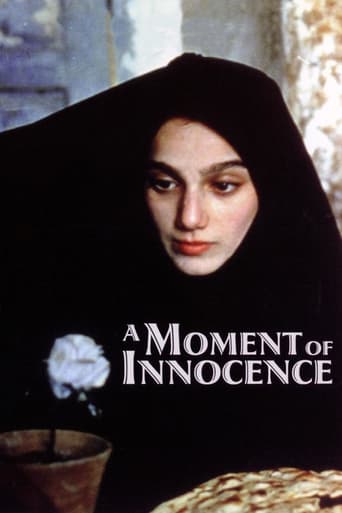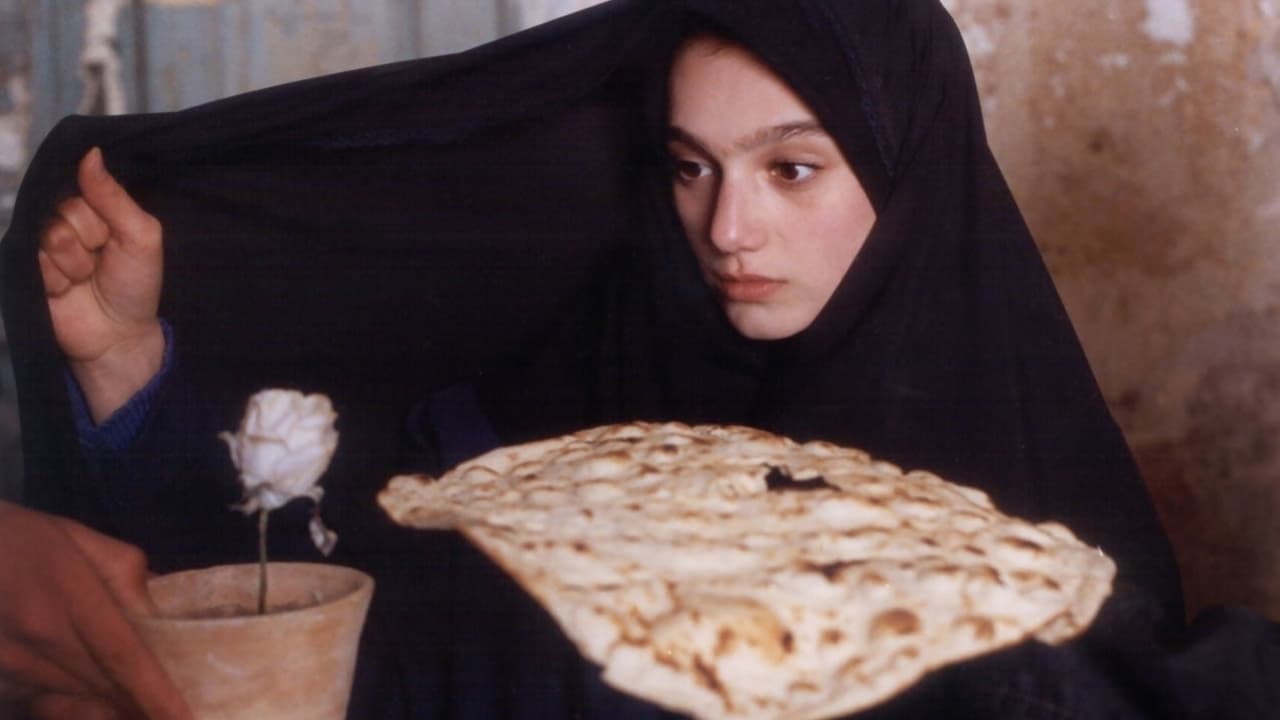Christopher Culver
Though Mohsen Makhmalbaf eventually established a reputation as one of Iran's foremost filmmakers from the late 1980s, his early life was tumultuous: when he was 17, he stabbed a police officer at a protest against the Shah's regime and spent the next four years in prison, only being released after the Shah's overthrow. His 1996 film NUN VA GULDOON ("Bread and Flowerpot", released in the English-speaking world as "A Moment of Innocence") looks back at this episode from his youth, attempting to jointly evoke both the red-hot passion against political injustice of a young man and his older, wiser understanding that such clumsy violence was hardly a productive way to solve the world's problems.The result is intricately constructed as a film-within-a-film. As it opens, we see the now 40-year-old policeman (Mirhadi Tayebi) visiting Tehran to ask Makhmalbaf for a part in one of his films to make up for the stabbing two decades before. Makhmalbaf, playing himself, decides to make a film loosely based on the stabbing. He chooses a young man (Ali Bakhsi) to play his younger self, and he then asks the policeman to choose an actor as the young version of himself. The policeman, who has a thuggish look and is bitter about never being offered parts in films besides villain ones, chooses a handsome guy to represent himself, but he is then overruled by the filmmaker who chooses a much more boyish-looking and vulnerable young man (Ammar Tafti), emphasizing just how young both Makhmalbaf and the policemen were at the time. This layer of NUN VA GULDOON broadly pokes fun at what Makhmalbaf's life had become after his rise to fame in Iran, having to endlessly deal with ordinary people who fancied themselves actors and were desperate to appear on screen. Much of this part of the film was shot concurrently with his effort SALAAM CINEMA, which is entirely about the film casting process.Makhmalbaf and the policemen begin coaching the actors playing their younger selves and we see those young people beginning to act their roles, as well as a young lady (Maryam Mohamadamini) playing a girl that the policeman was in love with at the time. In a magical realist fashion, the layers of the film shift in the middle of scenes: one moment we are watching actors play roles, the next moment it is as if the viewer is really seeing what happened in the mid-1970s. It is this magical intertwining of past and present that made NUN VA GULDOON such a powerful experience for me. The ending, which has been fairly praised as "the greatest freeze-frame since Truffaut's LES 400 COUPS", is just as much a work of art in itself as any still from a Tarkovsky film.Except for Makhmalbaf himself and Moharram Zaynalzadeh in a supporting role as his cameraman, none of the people in the film were trained actors. With Mirhadi Tayebi as the policeman, this is a weak part of the film: he delivers his lines in a stilted way and it is hard to suspend disbelief. With the others, however, Makhmalbaf made a smart choice, as Ammar Tafti and Ali Bakhsi are convincing in their roles, but there is still a youthful awkwardness and authenticity about them that would might have been lost if they were professionals. Most dazzling of all, however, is Maryam Mohamadamini as the love interest. She's a magnetic screen presence, and as the film leads to its incredible ending, she deftly conveys so much of the suspense and drama through gestures alone. It's a huge loss to cinema that she apparently never acted again.In spite of the film's limitations in terms of some of the acting and the limited resources Makhmalbaf had to work with when making the film, I found NUN VA GULDOON a moving film and that last freeze-frame literally breathtaking. I'd recommend this to any lover of cinema.
sharky_55
A Moment of Innocence, or The Bread and the Flower Pot, closely recalls fellow Iranian director Abbas Kiarostami's Close-Up, which also sough to recapture real life with its own dramatic conviction. In his own retelling of the story of a politically charged attempt to disarm and take a policeman's gun in his youth, Mohsen Makhmalbaf has created something so unique and so layered that it at first baffles the mind. Makhmalbaf wields the camera with an intent to retell faithfully and truthfully, in true Cinéma vérité style - his stylistic choices represent a documentary that cannot tell lies, and yet it becomes increasingly unreliable. In once scene, he converses with the young actor who will play him in the car in long take, talking about everything from future ambitions to romantic crushes, and it puts on a mask of genuineness. They approach his cousin's household to ask if her daughter will play a part in the film. As the girl goes to serve tea to the young actor, she suddenly whispers to him as if he has Mohsen himself, and they are planning the events that will lead to the fateful stabbing. It has suddenly becomes a moment of artifice without any stylistic or directorial indication. Another technique that Makhmalbaf plays with is one that Kiarostami also used in his 1999 film, The Wind Will Carry Us. While the camera films in wide shot and the characters walk further and further away, the sound levels do not adjust accordingly and realistically, but remain in our ears, as if they were right here next to us. Such a technique throws our objectivity up into the air; surely this must have been dubbed later? And near the end of the film Makhmalbaf will slowly add a musical soundtrack to dramatise the climatic encounter, and replace the still long takes with more dynamic follow shots and closeups. One thing that remains abundantly clear however is the amateur nature of the young actors.This tension is what makes the film tick. You see, both Makhmalbaf and the policeman seem to have entirely different accounts of what happened 20 years ago, and slowly they begin to realise this as they are in the process of recapturing those events. The policeman wants a tall, handsome young actor to portray him, and sulks when he does not get his way. He vigorously coaches the kid on how to properly play himself, and freely interrupts the filming process to criticise and adjust (and Makhmalbaf also freely layers perspectives of the camera onto each other). And yet, the artifice does shine through. Twice, the policeman storms off, the second after that tumultuous discovery that the 20 years of longing for the girl had been all for nothing, a lie to keep him awake. Makhmalbaf does not attempt to document these emotions in closeup, yet he is also eager to use the soundtrack to imitate the reaction. And he does not relent when he has the actors right in front of him; the policeman feigning suicidal thoughts after the discovery, and the young Mohsen breaking into tears and refusing to commit the violence of the past.This becomes the key to that breathtaking final freeze frame. Makhmalbaf seeks to recreate the truth, but has become aware of the impossibility of filming an objective, unbiased version of the past. That politically charged activist youth is no more, and the post-revolution mindset becomes clear in the young actor's ideals of saving mankind, but not through violence. And in the young policeman, who does not want to wield the gun to shoot, even if both are just artificial constructs. So they instead offer the bread and the flower pot, a symbolic blossoming of the new generation, and a testament to the ability of film to be able to reconcile and transform the reality of these weary old men.
jacques_05
Makhmalbaf has arguably created one of the MOST interesting films I have seen in my entire life. Casting young men unexperienced in acting to portray himself and the policemen he stabbed when he was 17, the director separates himself and his young self from the policemen and his; they separately train the actors portraying themselves 20 years earlier during an anti-Shah demonstration.Culminating in the showdown between the young actors, the truths behind the situation unbeknownst to both director and policemen become evident. An extremely powerful film, and I advise you to stop at nothing to view it.
amir-22
This is the greatest among the dozen or so Makhmalbaf titles I have seen. I was stunned that a movie so thematically complex (politics, history, redemption, etc.) can be conveyed with a superb lightness of touch. When you watch it, you really feel like you're watching a comedy. Only gradually does the movie reveal its many layers, culminating in a final freeze-frame that might be the BEST in all of cinema. More people should watch this movie! (It's certainly a lot more fun than anything by Abbas Kiarostami - a man who is more of a moral philosopher than a film-maker per se).


 AD
AD


